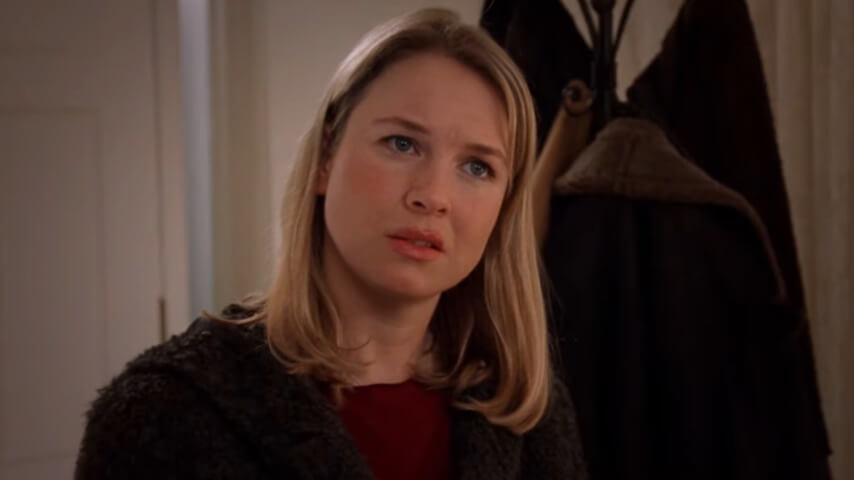Like the best romantic comedies, Bridget Jones's Diary is about more than just falling in love
The Renée Zellweger-led film didn't aim for realism, but it did manage to add some relatability to the rom-com fantasy.

As a lifelong lover of the much-maligned romantic comedy, I’ve always found it funny when people dismiss the genre as being too “unrealistic.” Those detractors aren’t necessarily wrong—they’re just mistaking a feature for a bug. Rom-coms aren’t aiming for realism and failing. They’re purposefully utilizing a heightened tone to tell fantastical stories about the relatable concept of falling in love. Rom-coms are to romance what James Bond films are to spies, both offering exhilarating escapism to an audience that isn’t necessarily looking to be reminded of the realities of life, love, or physics.
That said, if the term “rom-com” immediately conjures up images of klutzy women having contrived meet-cutes that lead to formulaic happily ever afters, you largely have the 1990s and early 2000s to thank for that. The romantic comedies of the 1930s gave us fast-talking men and faster-talking women. The ’50s and ’60s turned romantic comedies into colorful musicals. The ’80s sent its rom-coms back to high school. We’re currently in an era that favors rom-coms with a more naturalistic, even slightly somber tone—movies like Obvious Child and The Big Sick. But the broader cultural conception of a rom-com—the kind of formula SNL was mocking in this parody trailer for a Black Widow movie—was established during the genre’s most recent heyday at the turn of the 21st century.
Between 1990’s Pretty Woman and 2010’s Valentine’s Day (to measure the time in Garry Marshall films), glossy, big-budget, star-studded rom-coms ruled the box office. It was the age when Julia Roberts, Hugh Grant, and Meg Ryan were being directed by genre giants like Marshall, Nora Ephron, and Richard Curtis. They eventually gave way to the likes of Kate Hudson, Adam Sandler, Drew Barrymore, Jennifer Lopez, Matthew McConaughey, and Katherine Heigl, as well as writer-director Nancy Meyers. Whatever your feelings toward rom-coms, they were likely shaped by the films released during this period: Sleepless In Seattle. My Best Friend’s Wedding. How To Lose A Guy In 10 Days. 27 Dresses.
To begin this column, in which we’ll hop through time to explore the history of the rom-com, it makes sense to start with one released smack dab in the middle of that heyday, and one that’s a paragon of the genre: 2001’s Bridget Jones’s Diary. Based on Helen Fielding’s best-selling, acclaimed 1996 novel of the same title (it won British Book Of The Year in 1998), the highly anticipated film arrived after a decade of big-budget romantic comedies had made audiences familiar with the beats, but before their tropes had been completely solidified—something that, for better or for worse, Bridget Jones helped to do. In fact, the movie’s trailer plays beat-for-beat like the kind of thing that Black Widow parody was mocking. Yet it’s remarkable how little its clichéd trailer does justice to the sweet, funny, empathetic spirit of the film.
My grand theory when it comes to rom-coms is that the best center first and foremost on character growth—not romance. That’s especially true of Bridget Jones’s Diary. Bridget (Renée Zellweger) is an accident-prone 32-year-old who can’t seem to get her career, her body, or—most importantly—her love life in order. So after a particularly embarrassing start to the New Year in which she butts heads with awkward, aloof barrister Mark Darcy (Colin Firth), Bridget decides to turn her life around. She starts a diary to hold herself accountable, but it’s not long before she’s repeating old patterns and falling into bed with the “office scoundrel,” her boss Daniel Cleaver (Hugh Grant). Eventually, however, Bridget finds her confidence, while simultaneously realizing she may have misjudged Mark after all.
If all that sounds familiar, it could be because it’s loosely the plot of Jane Austen’s Pride And Prejudice, with Bridget as Lizzy Bennet, Daniel as George Wickham (albeit one who cheats on Bridget rather than eloping with her sister), and Mark as a literal Mr. Darcy—a character Firth had actually played in the beloved 1995 Pride And Prejudice miniseries. But it also probably sounds familiar because virtually every rom-com that followed would incorporate at least some element of the Bridget Jones formula, often to diminishing returns. So things that felt charmingly original at the time, like Bridget’s drunken and hilarious wallowing about her perpetual singlenesss to Eric Carmen’s “All By Myself,” now feel like worn-out tropes.
The best rom-coms—like Bridget Jones—care about the everyday lives of women in a way so few other mainstream genres do consistently.
 Keep scrolling for more great stories.
Keep scrolling for more great stories.
